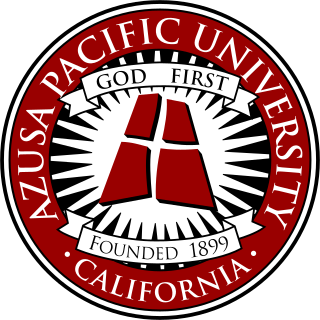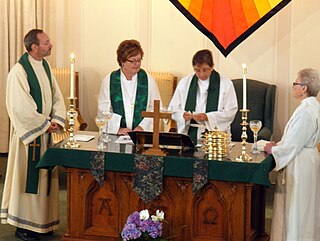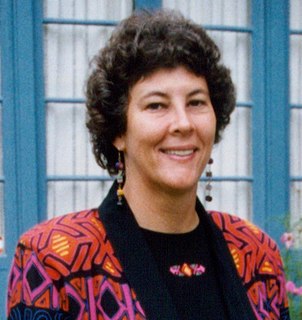Related Research Articles

Azusa is a city in the San Gabriel Valley, at the foot of the San Gabriel Mountains in Los Angeles County, California, United States, located 20 miles east of downtown Los Angeles.
George Ogden Abell was an American educator. Teaching at UCLA, priorly he worked as a research astronomer, administrator, as a popularizer of science and of education, and as a skeptic. He earned his B.S. in 1951, his M.S. in 1952 and his Ph.D. in 1957, all from the California Institute of Technology. He was a Ph.D. student under Donald Osterbrock. His astronomical career began as a tour guide at the Griffith Observatory in Los Angeles. Abell made great contributions to astronomical knowledge which resulted from his work during and after the National Geographic Society - Palomar Observatory Sky Survey, especially concerning clusters of galaxies and planetary nebulae. A galaxy, an asteroid, a periodic comet, and an observatory are all named in his honor. His teaching career extended beyond the campus of UCLA to the high school student oriented Summer Science Program, and educational television. He not only taught about science but also about what is not science. He was an originating member of the Committee on Scientific Investigation of Claims of the Paranormal now known as the Committee for Skeptical Inquiry.

Azusa Pacific University (APU) is a private, evangelical Christian university in Azusa, California. The university was founded in 1899, with classes opening on March 3, 1900, in Whittier, California, and began offering degrees in 1939. The university's seminary, the Graduate School of Theology, holds to a Wesleyan-Arminian doctrinal theology. APU offers more than 100 associate, bachelor's, master's, and doctoral programs on campus, online, and at seven regional locations across Southern California.

The Graduate Theological Union (GTU) is a consortium of eight private independent American theological schools and eleven centers and affiliates. Seven of the theological schools are located in Berkeley, California. The GTU was founded in 1962 and their students can take courses at the University of California, Berkeley. Additionally, some of the GTU consortial schools are part of other California universities such as Santa Clara University and California Lutheran University. Most of the GTU consortial schools are located in Berkeley area with the majority north of the campus in a neighborhood known as "Holy Hill" due to the cluster of GTU seminaries and centers located there.
Latino studies is an academic discipline which studies the experience of people of Hispanic ancestry in the United States. Closely related to other ethnic studies disciplines such as African-American studies, Asian American studies, and Native American studies, Latino studies critically examines the history, culture, politics, issues, and experiences of Hispanic people. Drawing from numerous disciplines such as sociology, history, literature, political science, religious studies and gender studies, Latino studies scholars consider a variety of perspectives and employ diverse analytical tools in their work.

Nancy L. Wilson is an American cleric who served as the moderator of the Universal Fellowship of Metropolitan Community Churches. Under Wilson's leadership, the denomination became known as "The Human Rights Church" in many parts of the world for its commitment to same-sex marriage, employment and housing non-discrimination laws.
Roy Isao Sano is a retired Japanese-American bishop of the United Methodist Church, elected in 1984.

Asia-Pacific Nazarene Theological Seminary (APNTS) is a graduate-level theological institution located near Metro Manila in the Philippines. APNTS is a seminary in the Wesleyan theological tradition and affiliated with the Church of the Nazarene through its Division of World Mission. Its mission is to prepare "men and women for Christ-like leadership and excellence in ministries." Its institutional vision is: "Bridging cultures for Christ, APNTS equips each new generation of leaders to disseminate the gospel of Jesus Christ throughout Asia, the Pacific, and the world.
Alexander Astin is the Allan M. Cartter Distinguished Professor Emeritus of Higher Education and Organizational Change, at the University of California, Los Angeles.
Robert Laird Harris was a Presbyterian minister, church leader, and Old Testament scholar.
The San Francisco Theological Seminary (SFTS) is a seminary in San Anselmo, California, with historic ties to the Presbyterian Church (U.S.A.); SFTS became embedded in the private, nonprofit University of Redlands in 2019.
Kevin W. Mannoia is the Professor of Ministry and Chaplain at Azusa Pacific University. He was the President of the National Association of Evangelicals from 1999 to 2001. Prior to this, he served as Bishop of the Free Methodist Denomination overseeing the western U.S. and Asia. In addition to his principal role at Azusa Pacific University, he is Founder and Chair of the Wesleyan Holiness Consortium, a contemporary manifestation of the Holiness movement comprising denominations and institutions sharing a common heritage in the Wesleyan and Holiness tradition. He also serves as President of the International Council for Higher Education, an international organization of institutions of higher learning focused upon integrated learning in the Christian tradition.
Grant J. Hagiya is a Bishop in the United Methodist Church, having been elected to that position in 2008.

G. James Daichendt is an art critic and art historian. He serves as the Dean of the Colleges and Professor of Art History at Point Loma Nazarene University in Southern California. He is also a Professor at Boston University.
Alexander White Pitzer (1834–1927) was an American Presbyterian clergyman. He was the author of several books on theology, and was a professor of biblical history and literature at Howard University.
Werner Zvi Hirsch was a German-born American economist. Born in small-town Germany, Hirsch emigrated to Mandatory Palestine to escape the Nazis in the late 1930s, where he attended the Hebrew University of Jerusalem. He emigrated to the United States in 1946 and received a PhD in economics from the University of California, Berkeley in 1949. He was a professor of economics at the University of California, Los Angeles (UCLA) from 1963 to 1990. He was an expert on urban economics and higher education policy.
Clyde J. Kennedy (1907-1962) was an American Bible Presbyterian pastor and Christian educator. He was the president of Shelton College and is best known for being the founder of Highland College.
Gilda Laura Ochoa is an American sociologist and professor. She is Professor of Chicana/o-Latina/o studies at Pomona College in the United States, and the author of Academic Profiling: Latinos, Asian Americans, and the Achievement Gap.

Susan Rubio is an American politician serving in the California State Senate. A Democrat, she represents the 22nd Senate District in eastern Los Angeles County. Prior to being elected to the California Legislature in 2018, she was an elected official for the City of Baldwin Park for 13 years and a public school teacher for 17 years.

Deborah Marrow was a foundation director and art historian who spent a 36-year career with the J. Paul Getty Trust in Los Angeles, California. She worked at the Trust from 1983 to 2019 including two assignments as interim president and chief executive officer and 30 years as Director of the Getty Foundation.
References
- 1 2 3 4 5 "Alexander Jun, Ph.D." Azusa Pacific University. Retrieved April 13, 2018.
- ↑ "APU Professor Alexander Jun Elected Moderator of Presbyterian Church in America". Azusa Pacific University. June 20, 2017. Retrieved April 13, 2018.
| This biography of an American academic is a stub. You can help Wikipedia by expanding it. |